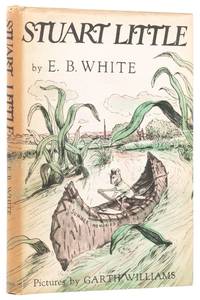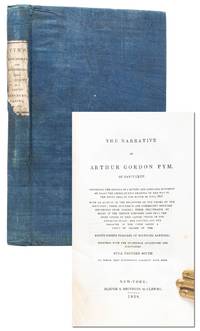first edition
1895 · London
by Wells, H.G.
London: William Heinemann, 1895. First U.K. edition. Very Good +. First issue, with the 16 pp. catalogue in the rear starting with "The Manxman." Publisher's tan buckram titled in purple with spine title in pale blue. Early twentieth century bookplates to upper endpapers. Offsetting to flyleaves but otherwise clean throughout. Partially unopened. Edges untrimmed. A Very Good+ copy of H.G. Wells' iconic and influential time travel novel.
"With his first novel, The Time Machine, which was immediately successful, Wells began a series of science fiction novels that revealed him as a writer of marked originality and an immense fecundity of ideas" (Encyclopedia Britannica). Setting the tone for the bulk of his career, The Time Machine reveals Wells' passionate interest in the relationship between individual men and their society, and his fascination with how science could assist or hold men back from true progress. Adapted to radio, television, and film, the novel follows the Time Traveler as he uses his machine to see the future and encounter yet-unknown societies. Though Wells was not the first person to utilize time travel as a literary device – Twain's A Connecticut Yankee in King Arthur's Court (1889) and Jane Loudon's The Mummy! A Tale of the Twenty-Second Century (1827) come to mind as earlier examples – he coined the term "time machine" and certainly popularized the concept of time travel for generations of science fiction authors and readers. Very Good +. (Inventory #: 7293)
"With his first novel, The Time Machine, which was immediately successful, Wells began a series of science fiction novels that revealed him as a writer of marked originality and an immense fecundity of ideas" (Encyclopedia Britannica). Setting the tone for the bulk of his career, The Time Machine reveals Wells' passionate interest in the relationship between individual men and their society, and his fascination with how science could assist or hold men back from true progress. Adapted to radio, television, and film, the novel follows the Time Traveler as he uses his machine to see the future and encounter yet-unknown societies. Though Wells was not the first person to utilize time travel as a literary device – Twain's A Connecticut Yankee in King Arthur's Court (1889) and Jane Loudon's The Mummy! A Tale of the Twenty-Second Century (1827) come to mind as earlier examples – he coined the term "time machine" and certainly popularized the concept of time travel for generations of science fiction authors and readers. Very Good +. (Inventory #: 7293)











